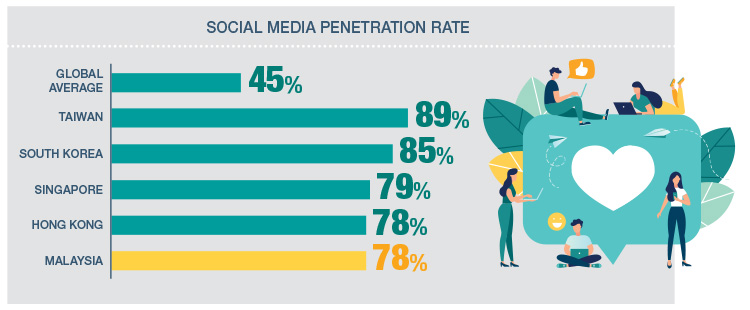Are we ready for social commerce? Do we even realise how much social media is affecting the way businesses are conducted?
Gan Chee Eng, Regional President of Amway Asia and Chairman of Amway China, shares his thoughts on why ABOs need to start taking social media seriously and make it an essential part of their everyday business.
This is Part 1 of a 2-part article on social commerce.
We are living in the age of social media. With the COVID-19 outbreak, we should indeed feel very lucky that we have embarked on digital transformation years ago. Can you imagine if this pandemic happened 20 years ago when there were no smart devices and social media was non-existent? How would that have impacted our business then?
Like it or not, COVID-19 has forced all of us to embrace the digital and social space. We are now living in the age of social media. All of us are shopping online, connecting with teams and customers online, posting in social media and selling via live streaming. Hence, we should seize the golden age of Social Commerce.
Let’s analyse the data for 2019. Globally, the average penetration rate for social media is 45%. Asia recorded the highest social media penetration rate in the world: Taiwan at 89%, South Korea at 85%, Singapore at 79%, Hong Kong and Malaysia both at 78%. And these numbers are increasing year-on-year.

Social media has dramatically changed our lives. In the past, sharing was by word of mouth. Now, we share our lives on social media platforms such as Instagram, Facebook, Line, WeChat, etc. People are not just keeping in touch with others, they are also sharing their passion, influencing others and being influenced by someone who might be hundred of miles away. Hence, instead of being restricted by the limitations of the physical world, the infinite space of the Internet allows a person to expand and amplify their sphere of influence exponentially.
Social media has changed our consumption behaviour and business model. Most buyers are starting their buying journey online, either by going through users’ reviews, a celebrity’s Vlog or an acquaintance’s post. The Gig Economy is booming thanks to social media. There’ll be more people, who used to be influential only among their own circle, now becoming Key Opinion Consumers (KOC) or even Key Opinion Leaders (KOL), using their personal brand to sell and earn. It has changed the career preferences of many young people, with many of them having voiced out that their favourite career choice is to be a social influencer.
Social media has changed the communication approach. In the past, one can afford to be pushy. But in the age of social media, people will unfollow or block you if you posted irritating messages or spam. Hence, we need to adopt the “pull” method instead, which means to attract those who are really interested in what you have to say. That’s why producing relevant, interesting content that resonates with your target audience and social followers is important in growing and retaining your reach and engagement with potential customers. The loyalty generated on social media this way will be organic, healthy and sustainable.
Social media has become an important online base for ABOs to acquire and retain communities of engaged customers. The global coronavirus outbreak has forced traditional business models to accelerate their digital transformation effort. Many ABOs are also adapting quickly. For example, in Amway China, over 70% of the members of the Founders Council and more than 50% of Diamond Leaders have started livestreaming. In Amway Hong Kong, thousands of ABOs are having Zoom meetings. As Amway continues to make investments in improving the overall digital experience, our products will be designed to be sharable and easier to display on social media, and our digital platforms will be updated to adapt to the needs of social commerce. We believe that social commerce will bring great growth opportunities to ABOs around the world.
To paraphrase a popular phrase, “Opportunity favours only the prepared mind”. In the next decade, Gen Z will rise to be a major consumer as well as the main force of society as they will grow up alongside social media and social commerce. We need to continue to upgrade ourselves, so as not just be a “friend” to the younger generation, but also a “friend” of the times.
There is a popular belief today which is, “Who is selling” is more important than “what is being sold”. In the past, it was product-centric, which required us to keep “beautifying” our products. Today, the trend is to be people-centric, requiring us to beautify the “person”, i.e. enhancing one’s charm and personality in order to build a personal brand. Simply put, the same product being sold by different people will have completely different results.
To build your personal brand, you need to constantly produce relevant and interesting content, one which resonates with your target audience. The content should be helpful in building your personal hashtags, which differentiates you from the rest.

Last year, during Alibaba’s 11.11 Single’s Day online sale, more than 50% of the brands on the platform did livestreaming to sell their wares. In just one day, the transaction generated by live-streamers reached nearly US$2.9 billion. As long as customers like and trust the live-streamers, they will follow them and buy the product, regardless if they have ever heard of the brand before.
When people want to use the products you use, and want to live the way you live your life, your personal brand can be monetised.
Digital transformation is just like a train that is about to leave the station. Everyone has a ticket. Some people are already on the train, while others are still watching from the platform. There are also those who don’t even know where the platform is. The train starts slowly, but it will go further and faster. Those who don’t get onboard will be left behind.
We are all standing on this platform. Yesterday was eCommerce, today is social commerce. When the technology comes, everyone has to make the choice between waiting and watching, or to catch up quickly.